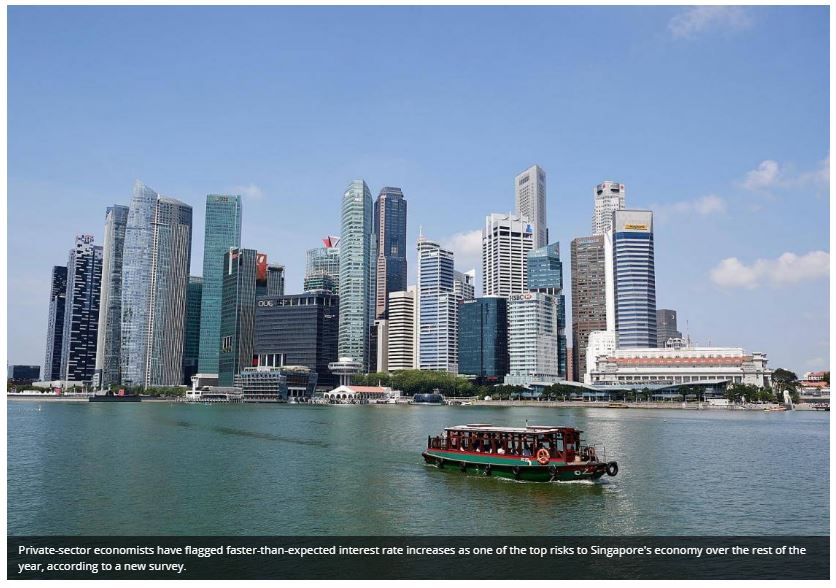Singapore economy at risk from faster-than-expected rate hikes
PRIVATE-SECTOR economists have flagged faster-than-expected interest rate increases as one of the top risks to Singapore’s economy over the rest of the year, according to a new survey.
The threat of a global trade war also remains a key concern among those polled in the survey conducted by the Monetary Authority of Singapore (MAS).
The central bank’s latest quarterly survey points to growing concerns among private sector economists about the impact of rising interest rates, in particular tightening global financial conditions if the United States Federal Reserve raises rates more quickly than expected.
This risk was cited by 47 per cent of respondents, up from 17 per cent in the last survey in March.
The US central bank last raised interest rates in March, and is expected to do so again at its two-day meeting which began on Tuesday.
The rate hikes highlight the Fed’s growing confidence that tax cuts and government spending will boost the economy and lift inflation. Rates were raised three times last year.
CIMB Private Bank economist Song Seng Wun said that market watchers are getting nervous as the pace of rate increases picks up, amid worries that higher US interest rates will result in capital flows out of emerging markets as well as raise borrowing costs and debt refinancing risks. “Singapore could get caught up in these vulnerabilities,” he added.
Still, Mr Song noted that the impact of faster-than-expected rate increases has “always been a risk but has never really materialised”.
Maybank Kim Eng economist Chua Hak Bin does not expect rising interest rates to dampen growth significantly this year, as increases have been very gradual and real interest rates remain low.
“Mortgage rates are still around 2.5 per cent or below,” Dr Chua noted. “Rising interest rates will start to bite in late 2019 when the Fed funds rate approaches 3 per cent.”
The MAS’s latest quarterly survey also showed that economists see trade protectionism as the biggest downside risk for Singapore’s economy.
Trade protectionism was cited by 84 per cent of respondents as the top risk. This was down slightly from 88 per cent in March’s survey, but still significantly higher than 40 per cent in December’s poll.
Meanwhile, concerns about a slowdown in China appear to have eased, with 21 per cent of respondents flagging it as a key risk, down from 53 per cent previously.
Economists polled expect the Singapore economy to grow 3.2 per cent this year, unchanged from estimates in the last survey in March.
Official forecasts from the Ministry of Trade and Industry expect full-year economic growth of between 2.5 per cent and 3.5 per cent this year. This comes after the economy expanded 3.6 per cent in 2017, lifted mainly by strong demand for manufacturing exports.
The services sector is set to become a stronger economic growth engine this year amid concerns that activity in manufacturing could taper.
The finance and insurance sector, for instance, is tipped to expand 7 per cent according to economists surveyed, up from 4.4 per cent in the previous poll.
Meanwhile, growth in the accommodation and food services sector is now expected to come in at 2.2 per cent, up from 1.9 per cent previously.
Manufacturing is expected to expand a robust 5.3 per cent this year, also higher than previous estimates of 4.3 per cent.
Some economists have warned that the sector, which makes up a fifth of the economy, could moderate this year after growing at breakneck speed last year on the back of surging export demand for electronics and precision engineering products.
“The services uplift is coming in stronger than expected, with financial services leading the charge,” said Dr Chua.
“The tapering of manufacturing growth is more gradual than expected. Electronics production is proving remarkably resilient, even as exports contract and global smartphone sales slow.”
Other sectors are doing less well. The outlook for the construction sector has taken a turn for the worse, going by the latest survey, with respondents anticipating a contraction of 2.1 per cent. The previous survey released in March flagged one per cent growth in the sector.
The outlook for private consumption growth has also eased – economists in the latest poll expect a rise of 2.2 per cent, compared with 3.1 per cent in the previous quarter’s survey.
The latest MAS survey reflects the views of 24 analysts who monitor the Singapore economy. It was sent out on May 24, 2018.
Source: http://www.sgsme.sg/news/government/singapore-economy-risk-faster-expected-rate-hikes


 Thailand
Thailand




